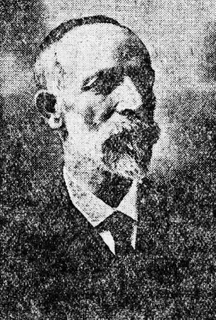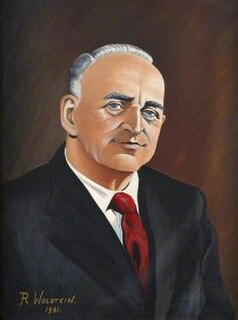Related Research Articles

James Keir Hardie was a Scottish trade unionist and politician. He was a founder of the Labour Party, and served as its first parliamentary leader from 1906 to 1908.
Edward Hunter 2 June 1885 – 6 December 1959 was a Scottish socialist active in both Scotland and New Zealand. He was a trade union organiser, politician and a writer, and played a considerable role in the development of socialism in New Zealand. Born in Lanarkshire he was the son of a miner, which he later became himself at the age of 12 after receiving little formal education. He emigrated to the West Coast of New Zealand in 1906, already a committed socialist, influenced by Scottish left-wing thinkers such as Keir Hardie and Bob Smillie. As a miners' leader, Hunter became a leading member of the New Zealand Federation of Labour.

The Scottish Labour Party (SLP), also known as the Scottish Parliamentary Labour Party, was formed by Robert Bontine Cunninghame Graham, the first socialist MP in the Parliament of the United Kingdom, who later went on to become the first president of the Scottish National Party, and Keir Hardie, who later became the first leader of the Independent Labour Party and the Labour Party.
Scottish Workers' Representation Committee was the parliamentary outfit of the Scottish Trades Union Congress from 1899 until 1909. It was known as the Scottish Workers Parliamentary Elections Committee until 1903. In contrast to the Labour Representation Committee (LRC) in England, SWRC was able to maintain organisational unity between different strands of ideological tendencies in Scotland, ranging from Marxist, Catholic and Fabian socialists.
The Miners' Federation of Great Britain (MFGB) was established after a meeting of local mining trade unions in Newport, Wales in 1888. The federation was formed to represent and co-ordinate the affairs of local and regional miners' unions in England, Scotland and Wales whose associations remained largely autonomous. At its peak, the federation represented nearly one million workers. It was reorganised into the National Union of Mineworkers in 1945.
The Scottish United Trades Councils Labour Party, also known as the Scottish Trades Councils Independent Labour Party, was a Scottish labour party.

Robert Smillie was a Scottish trade unionist and Labour Party politician. He was a leader of the coal miners, and played a central role in moving support from the miners away from the Liberal Party to the Labour Party. He had a firm commitment to socialism as an ideal, and militancy as a tactic.
William Henry Drew was a British textile worker, early trade unionist and one of the founders of the Independent Labour Party.
The 1888 Mid Lanarkshire by-election was a parliamentary by-election held on 27 April 1888 for the House of Commons constituency of Mid Lanarkshire in Scotland.

The National Union of Scottish Mineworkers (NUSW) is a trade union in Scotland, founded in 1894 as the Scottish Miners Federation. It joined the Miners' Federation of Great Britain, and in 1914 changed its name to National Union of Scottish Mineworkers. It survives as the National Union of Mineworkers.

A by-election was held for the British House of Commons constituency of Sheffield Attercliffe on 5 July 1894. It was the first parliamentary election contested by the Independent Labour Party.

Allen Gee was a British trade unionist and politician.
William Small was a Scottish trade unionist.

Abraham Moffat was a Scottish trade unionist and communist activist. He was elected repeatedly to high office in the trade unions and represented the union on government coal boards. He held major union offices: President of the National Union of Scottish Mine Workers; member of the Executive Committee of the Miners' Federation of Great Britain; Vice-Chairman Scottish Regional Coal Board; and member National Coal Board. He served as president of the union from 1942 to his retirement in 1961, when he was succeeded by his younger brother Alex Moffat, also an activist.
Alexander B. Moffat was a Scottish trade unionist and communist activist who was President of the Scottish Trades Union Congress and the Scottish Mineworkers Union.
The Ayrshire Miners' Union was a coal mining trade union based in Scotland.
Glasgow Trades Council is an association of trade union branches in Glasgow in Scotland.
George Carson was a Scottish trade unionist.
Robert Mathieson Small was a Scottish trade unionist and political activist.
This article is about the sponsorship of British Members of Parliament by mining trade unions.
References
- 1 2 3 Ian MacDougall, Mid and East Lothian Miners' Association minutes: 1894-1918, pp.42-43
- ↑ David Howell, British Workers and the Independent Labour Party, 1888-1906, pp.146, 150
- ↑ David Howell, British Workers and the Independent Labour Party, 1888-1906, p.156
- ↑ David Howell, British Workers and the Independent Labour Party, 1888-1906, pp.296
- 1 2 "Former Miners' Leader - Death of Mr Robert Chisholm Robertson", The Scotsman , 14 March 1930
- ↑ Robin Page Arnot, A history of the Scottish miners from the earliest times, p.74